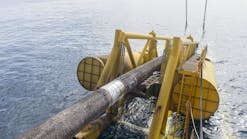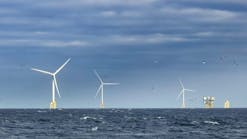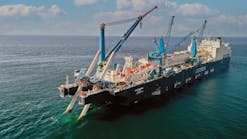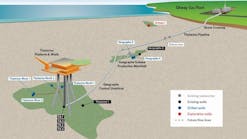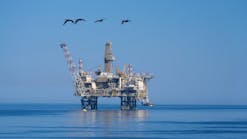Nick Terdre
Contributing Editor
Independent companies are exercising a growing influence on Norway's oil and gas sector. Compared with the UK, where independents are numbered in the dozens, the trend is still at a relatively early stage, but this is also one of the attractions for the new arrivals.
Last year, an important milestone was passed in the sector's move toward maturity, with the transfer of BP's Gyda asset to Talisman Energy. The latter is a newcomer to Norway, but in the UK is an acknowledged leader in mature asset management. A similar move on a smaller scale took place when PGS, already well established as a contractor in Norway, took over operatorship of the Varg field from Norsk Hydro.
To facilitate the entry of more new players into the sector, the Norwegian Petroleum Directorate (NPD) has set up a pre-qualification process under which companies can apply to become licensees or operators even though they own no Norwegian assets. Anadarko Petroleum and Mærsk Olie og Gass, along with Talisman, were recently granted operator status. So far, a total of 13 companies have been approved as operators under this process, of which four – Anadarko, Kerr-McGee, Lasmo, and Mærsk – own no Norwegian assets.
With the disappearance of Saga Petroleum, Norway's only medium-size private oil company, in 2000, the formation of more new Norwegian independents might have been expected, but in fact the response has been muted. And with the exception of Talisman, there is a glaring absence of mid-size companies. A recent report commissioned by the Konkraft industry forum concluded that the Norwegian sector would benefit, as the UK has done, from attracting more players of this size.
While some of the newcomers, like Dong and Gaz de France, are primarily interested in gas, others see their niche in the mature fields and undeveloped oil pools of the North Sea. The two companies profiled below, OER Oil and Revus Energy, come into this latter category.
The Gyda platform, originally operated by BP, but now by Talisman.
null
OER Oil
OER Oil AS, which emerged as a Norwegian oil company in 2001, acquired its first assets in late 2002 from Norsk Hydro. These comprised 2.5% in the Njord field and 4.44% in Brage. In approving these deals, the government also accepted OER as a licensee in Norway's oil and gas sector. The company had previously participated in the sale of assets from the State's Direct Financial Interest (SDFI) in 2002. Though it was unsuccessful on this occasion, the process provided a good reference for the company, according to CEO Per Gunnar Løge.
Needing additional funds to complete the Njord and Brage deals, OER decided to expand its equity base by issuing new shares. It came to an agreement with Sweden's Lundin Petroleum whereby the latter not only took up the planned equity increase, but also provided financial resources to facilitate OER's growth.
"This has given Lundin 75% ownership of the company, but OER continues as a separate entity, operating in accordance with its original business concept," says Løge.
The Njord and Brage assets have given the company a production level of around 2,500 b/d of oil and reserves of some 7 MMboe. In has since added to its portfolio by acquiring Aker Energy, including its 49% interest in PL 270, which contains the Agat discovery. OER is also part of a group awarded acreage near Brage.
The company is basically targeting small to medium-size fields and oil reserves rather than gas. Oil is easier to handle, and OER does not anticipate moving into the gas sales business. Its horizons are not restricted merely to the Norwegian sector. Lundin could facilitate its entry into the international arena, but neither Lundin nor OER would like to become involved in direct or uncoordinated competition with each other, Løge points out.
OER intends to be an active partner in its licenses. It sees its contribution coming mainly in the areas of reservoir drainage, drilling and wells, and facilities operation. The first area hopefully contributes to income, while the latter two represent the big expenditure areas, and as such deserve the partners' full attention.
According to Løge, the company's philosophy is that there is always potential for improvement. "We don't see any justification for postponing efficiency measures until they're absolutely essential." he says. Another priority is health, safety, and the environment, where OER aims to achieve zero impact in all its partnerships.
The four-level concept is considered by OER Oil to be a valuable tool for field operations.
null
Revus Energy
Newcomer Revus Energy was awarded its first exploration license in December, having been pre-qualified by the authorities as a licensee on the Norwegian continental shelf earlier last year. The Stavanger-based start-up company has 40% of PL 305, which covers part-blocks 24/9 and 25/7, and DNO, the operator, 60%. The acreage lies close to a number of recent finds, including Marathon's 2003 discoveries west of Heimdal, general manager Tim Sullivan points out, and is well known to both partners. They have two years to reprocess existing 3D seismic, after which they face a drill-or-drop decision.
Revus, which was established in December 2002, has at its core three ex-Enterprise Oil stalwarts with previous experience of working in the Norwegian sector: Sullivan himself, Andrew Armour (chairman) and Harald Vabø (business development manager). There are also two geoscientists, Svein Ilebekk and Walter Sognnes, formerly of Aker Geo and PGS respectively, while the chief financial officer is Geir Hjellvik, previously group treasurer at RWE-Dea.
"One of the concerns for a start-up company is credibility in the marketplace, but with our Enterprise badge we're accepted as technically competent," says Sullivan. Revus aims to position itself initially in tail-end production. "There's huge industrial logic behind this, given that large companies are willing to sell depleting assets to smaller companies," he adds.
Revus aims to bring value to assets with its subsurface expertise in geology, geophysics and reservoir engineering. "Our contribution won't be in topside engineering, or in halving the workforce or operational costs. Instead we will concentrate on increasing the number of barrels – we believe there's more money to be made out of this."
Some of the Revus Energy team: from left, Business Development Manager Harald Vabø, General Manager Tim Sullivan, and geoscientists Walter Sognnes and Svein Ilebekk.
null
Revus does not have ambitions of becoming an operator, unless a good opportunity arises and no other party is willing to take on the operatorship. One of Enterprise's strengths, particularly in Norway, was its contribution as a partner, Sullivan points out. While the operator is preoccupied with the practicalities of day-to-day operations, the partner has more time for creative thinking.
Revus has a two-stage strategy under which it will first establish a production base before building on its exploration position. Production of 50,000 boe/d, allied with reserves of 120 MMboe, is considered achievable within five years.
The company has raised financial backing in the shape of a NKr140-million agreement with Energivekst, a fund organized by the Norwe-gian venture capital concern HitecVision, and a further NKr 140 million committed by 3i, the UK venture capital group.
Last year, Revus was invited to all the data rooms of Norwegian assets placed on sale, including BP's Gyda interest. It is looking to acquire meaningful stakes, says Sullivan – 15% plus, rather than 2-3%. More production assets are coming onto the market, he adds.
The fact that the era of small independents is well advanced in the UK while still in the early stages in Norway is an attraction for Revus. The competition in Norway is not as great. There is also more to go for, as Norway's mature areas abound with small-scale exploration opportunities. "There will be a Buzzard found in Norway in the next five years," Sullivan says, referring to EnCana UK's 400 MMbbl discovery, "and we want to be part of it."




